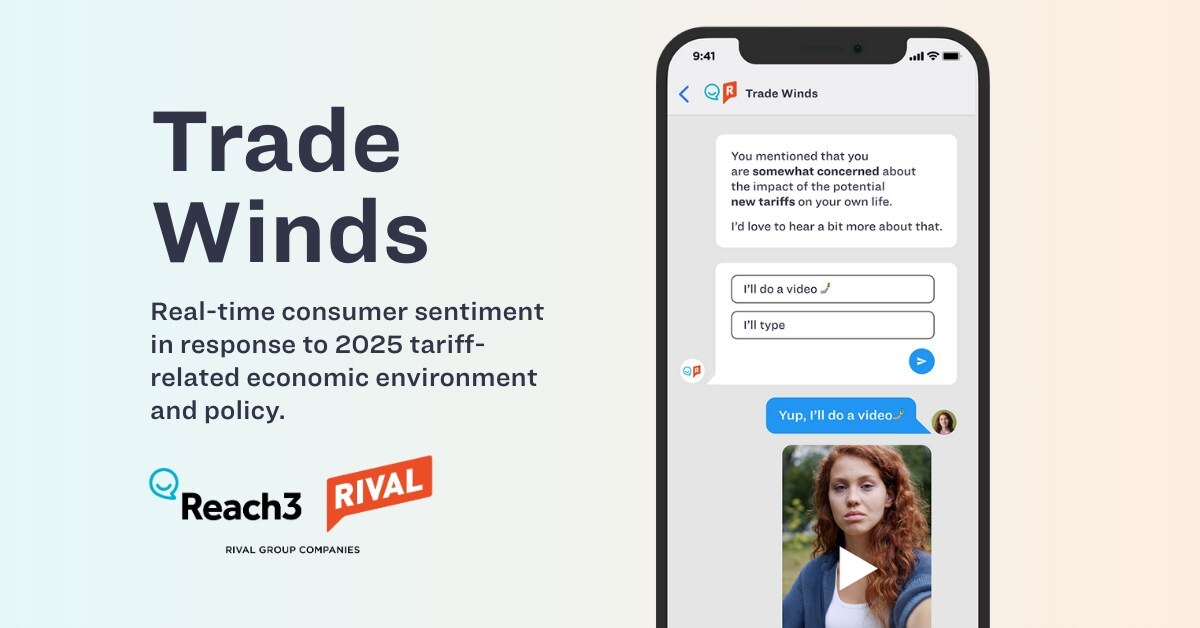
Study offers advice for businesses as consumer sentiment turns deeply negative
MORE THAN HALF of all Americans plan to cut non-essential purchases as tariffs take effect, according to new findings from Trade Winds, an ongoing research initiative designed to track consumer sentiment and behavior in real time. Many are already changing their spending behavior.
The study found that overall consumer sentiment is deeply negative, with most participants reporting emotions such as stress, pessimism, frustration or anxiety.
"With this research, we're showing how macro forces are affecting consumer behavior now and in the future, giving brands across industries the insights needed to make strategic decisions with greater confidence," says Matt Kleinschmit, CEO of Reach3 Insights. With Rival Technology, the company is using mobile-first conversational research methods and technology,
"Our unique mobile chat-based, conversational methodology allows us to go beyond surface-level responses and uncover the underlying emotions and context driving people's attitudes and behaviors. Because this is an ongoing community program, we'll continue to track how sentiment and behavior evolves over time, giving brands a dynamic view into shifting consumer mindsets."
The initial wave found that 83% of Americans believe that they understand what tariffs are, and three in four are concerned about how these changes will impact them financially.
More than half expressed low optimism about their future, and 40% felt the same about their personal finances.
"Tariffs are taxes, and we're the ones who pay them," said one respondent. This understanding is already driving changes in behavior. Survey participants said they plan to:
- Cut back on non-essential purchases (51%)
- Start budgeting (39%)
- Switch to more affordable brands (37%)
- Delay larger purchases (36%)
- Buy smaller quantities (30%)
- Buy second hand items (24%)
- Stock up on household essentials (24%)
Groceries are the most commonly cited inflationary concern, with 67% anticipating higher prices. Other vulnerable categories include electronics, clothing, household items, and healthcare. Many Americans are already shopping at discount retailers, using more coupons, and switching to no-name brands to stay within budget.
Consumers to brands: show empathy, not opportunism
Respondents expressed frustration with brands perceived as profiting from the situation. "Don't use tariffs as a pretext to raise prices and increase your profit margins," one participant warned. Others urged brands to offer meaningful discounts, reward loyal customers, and demonstrate shared sacrifice, such as freezing executive salaries.
Message to policymakers: we are not OK
Participants also directed sharp criticism at political leaders. Many said they feel overlooked and unsupported as the cost of living climbs
"The little people can't avoid these higher costs," one respondent said. Others urged greater transparency, stronger communication, and policy decisions that reflect the reality of living paycheck to paycheck.
Kleinschmit added, "Brands that strike the right balance of empathy and value have an opportunity to both gain market share from competitors while also developing deeper loyalty with consumers facing an uncertain economic future."
Trade Winds provides a vivid and timely snapshot of consumer attitudes and actions, helping brands and businesses stay ahead of market shifts and respond more effectively to audience needs.
